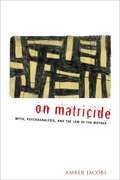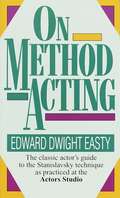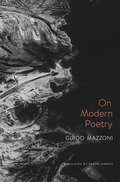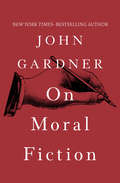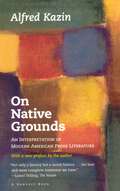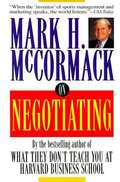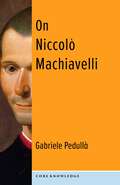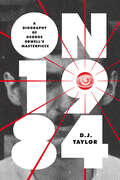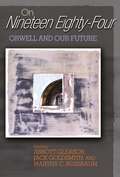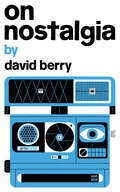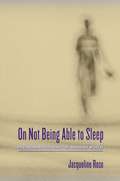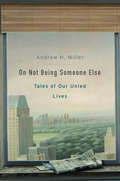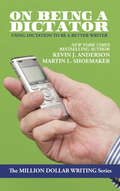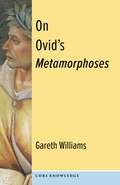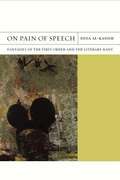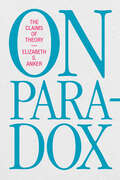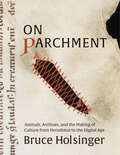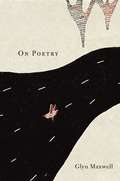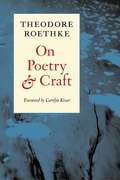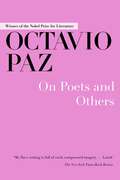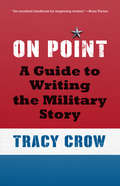- Table View
- List View
On Matricide: Myth, Psychoanalysis, and the Law of the Mother
by Amber JacobsDespite advances in feminism, the "law of the father" remains the dominant model of Western psychological and cultural analysis, and the law of the mother continues to exist as an underdeveloped and marginal concept. In her radical rereading of the Greek myth, Oresteia, Amber Jacobs hopes to rectify the occlusion of the mother and reinforce her role as an active agent in the laws that determine and reinforce our cultural organization.According to Greek myth, Metis, Athena's mother, was Zeus's first wife. Zeus swallowed Metis to prevent her from bearing children who would overthrow him. Nevertheless, Metis bore Zeus a child-Athena-who sprang forth fully formed from his head. In Aeschylus's Oresteia, Athena's motherless status functions as a crucial justification for absolving Orestes of the crime of matricide. In his defense of Orestes, Zeus argues that the father is more important than the mother, using Athena's "motherless" birth as an example. Conducting a close reading of critical works on Aeschylus's text, Jacobs reveals that psychoanalytic theorists have unwittingly reproduced the denial of Metis in their own critiques. This repression, which can be found in the work of Sigmund Freud and Melanie Klein as well as in the work of more contemporary theorists such as André Green and Luce Irigaray, has resulted in both an incomplete analysis of Oresteia and an inability to account for the fantasies and unconscious processes that fall outside the oedipal/patricidal paradigm. By bringing the story of Athena's mother, Metis, to the forefront, Jacobs challenges the primacy of the Oedipus myth in Western culture and psychoanalysis and introduces a bold new theory of matricide and maternal law. She finds that the Metis myth exists in cryptic forms within Aeschylus's text, uncovering what she terms the "latent content of the Oresteian myth," and argues that the occlusion of the law of the mother is proof of the patriarchal structures underlying our contemporary social and psychic realities. Jacobs's work not only provides new insight into the Oresteian trilogy but also advances a postpatriarchal model of the symbolic order that has strong ramifications for psychoanalysis, feminism, and theories of representation, as well as for clinical practice and epistemology.
On Melville: The Best from American Literature
by Louis J. Budd Edwin H. CadyFrom 1929 to the latest issue, American Literature has been the foremost journal expressing the findings of those who study our national literature. American Literature has published the best work of literary historians, critics, and bibliographers, ranging from the founders of discipline to the best current critics and researchers. The longevity of this excellence lends a special distinction to the articles in American Literature. Presented in order of their first appearance, the articles in each volume constitute a revealing record of developing insights and important shifts of critical emphasis. Each article has opened a fresh line of inquiry, established a fresh perspective on a familiar topic, or settled a question that engaged the interest of experts.
On Method Acting: The Classic Actor's Guide to the Stanislavsky Technique as Practiced at the Actors Studio
by Ward DwightPracticed by such actors of stature as Marlon Brando, Robert De Niro, Julie Harris, Dustin Hoffman, and Ellen Burstyn (not to mention the late James Dean) the Method offers a practical application of the renowned Stanislavsky technique.On Method Acting demystifies the "mysteries" of Method acting -- breaking down the various steps into clear and simple terms, including chapters on:Sense Memory -- the most vital component of Method actingImprovisation -- without it, the most integral part of the Method is lostAnimal Exercises -- just one way to combat the mental blocks that prevent actors from grasping a characterCreating The Outer Character -- so actors can give the freshness of originality to a role while at the same time living the life of the characterOn Method Acting is also an indispensable volume for directors, designers, lighting technicians, and anyone in the dramatic arts interested in creating a believable and realistic effect in their productions.
On Modern Poetry
by Guido MazzoniAn incisive, unified account of modern poetry in the Western tradition, arguing that the emergence of the lyric as a dominant verse style is emblematic of the age of the individual. Between the end of the eighteenth century and the beginning of the twentieth, poetry in the West was transformed. The now-common idea that poetry mostly corresponds with the lyric in the modern sense—a genre in which a first-person speaker talks self-referentially—was foreign to ancient, medieval, and Renaissance poetics. Yet in a relatively short time, age-old habits gave way. Poets acquired unprecedented freedom to write obscurely about private experiences, break rules of meter and syntax, use new vocabulary, and entangle first-person speakers with their own real-life identities. Poetry thus became the most subjective genre of modern literature. On Modern Poetry reconstructs this metamorphosis, combining theoretical reflections with literary history and close readings of poets from Giacomo Leopardi to Louise Glück. Guido Mazzoni shows that the evolution of modern poetry involved significant changes in the way poetry was perceived, encouraged the construction of first-person poetic personas, and dramatically altered verse style. He interprets these developments as symptoms of profound historical and cultural shifts in the modern period: the crisis of tradition, the rise of individualism, the privileging of self-expression and its paradoxes. Mazzoni also reflects on the place of poetry in mass culture today, when its role has been largely assumed by popular music. The result is a rich history of literary modernity and a bold new account of poetry’s transformations across centuries and national traditions.
On Moral Fiction: On Becoming A Novelist, On Writers And Writing, And On Moral Fiction (Basic Books Classics)
by John Gardner&“Fearless, illuminating&” criticism from a New York Times–bestselling author and legendary teacher, &“proving . . . that true art is moral and not trivial&” (Los Angeles Times). Novelist John Gardner&’s thesis in On Moral Fiction is simple: &“True art is by its nature moral.&” It is also an audacious statement, as Gardner asserts an inherent value in life and in art. Since the book&’s first publication, the passion behind Gardner&’s assertion has both provoked and inspired readers. In examining the work of his peers, Gardner analyzes what has gone wrong, in his view, in modern art and literature, and how shortcomings in artistic criticism have contributed to the problem. He develops his argument by showing how artists and critics can reintroduce morality and substance to their work to improve society and cultivate our morality. On Moral Fiction is an essential read in which Gardner presents his thoughtfully developed criteria for the elements he believes are essential to art and its creation. This ebook features an illustrated biography of John Gardner, including original letters, rare photos, and never-before-seen documents from the Gardner family and the University of Rochester Archives.
On Native Grounds: An Interpretation Of Modern American Prose Literature (Harvest Book Ser.)
by Alfred KazinA classic interpretation of literature from America's golden age-including the work of Howells, Wharton, Lewis, Cather, Fitzgerald, Hemingway, and Faulkner. New Preface by the Author; Index.
On Negotiating
by Mark H. MccormackAn advanced course on the art of negotiating, this book is filled with personal and professional anecdotes to illustrate the concepts.
On Niccolò Machiavelli: The Bonds of Politics (Core Knowledge)
by Gabriele PedullàFive hundred years after his death, Niccolò Machiavelli still draws an astonishing range of contradictory characterizations. Was he a friend of tyrants? An ardent republican loyal to Florence’s free institutions? The father of political realism? A revolutionary populist? A calculating rationalist? A Renaissance humanist? A prophet of Italian unification? A theorist of mixed government? A forerunner to authoritarianism? The master of the dark arts of intrigue?This book provides a vivid and engaging introduction to Machiavelli’s life and works that sheds new light on his originality and relevance. Gabriele Pedullà—a leading Italian expert and acclaimed writer—offers fresh readings of the Florentine thinker’s most famous writings, The Prince and the Discourses on Livy, as well as lesser-known texts. A new and often surprising Machiavelli emerges: one closer to his time but also better suited to inform our own. Pedullà’s portrait of Machiavelli highlights his close attention to social and emotional bonds, staunch opposition to oligarchy, keen awareness of the economic side of power dynamics, and strong preference for history over philosophy as a guide for leaders.This book recovers the excitement Machiavelli roused in his first readers for a twenty-first-century audience, capturing his capacity to provoke, both then and now, with unconventional ideas and startling insights.
On Nineteen Eighty-Four: A Biography of George Orwell's Masterpiece (Books About Books)
by D.J. TaylorThe essential backstory to the creation and meaning of one of the most important novels of the twentieth century—and now the twenty-first.Since its publication nearly seventy years ago, George Orwell’s 1984 has been regarded as one of the most influential novels of the modern age. Politicians have testified to its influence on their intellectual identities, rock musicians have made records about it, TV viewers watch a reality show named for it, and a White House spokesperson tells of “alternative facts.” The world we live in is often described as an Orwellian one, awash in inescapable surveillance and invasions of privacy. On Nineteen Eighty-Four dives deep into Orwell’s life to chart his earlier writings and key moments in his youth, such as his years at a boarding school, whose strict and charismatic headmaster shaped the idea of Big Brother. Taylor tells the story of the writing of the book, taking readers to the Scottish island of Jura, where Orwell, newly famous thanks to Animal Farm but coping with personal tragedy and rapidly declining health, struggled to finish 1984. Published during the cold war—a term Orwell coined—Taylor elucidates the environmental influences on the book. Then he examines 1984’s post-publication life, including its role as a tool to understand our language, politics, and government.In a climate where truth, surveillance, censorship, and critical thinking are contentious, Orwell’s work is necessary. Written with resonant and reflective analysis, On Nineteen Eighty-Four is both brilliant and remarkably timely. Praise for On Nineteen Eighty-Four“A lively, engaging, concise biography of a novel.” —Kirkus Reviews“The fascinating origins and complex legacy of this enduring masterwork are chronicled in [this] arresting new book.” —BookPage“Brisk [and] focused. . . . Taylor here covers the highlights, giving both an overview of Orwell’s career and a survey of his greatest literary achievement.” —Wall Street Journal“Taylor is an accomplished literary critic and he illuminates Orwell’s work in the context of his life, elegantly and expertly charting his course from Grub Street to bestsellerdom.” —TheGuardian
On Nineteen Eighty-Four: Orwell and Our Future
by Abbott Gleason, Jack Goldsmith, and Martha C. NussbaumGeorge Orwell's Nineteen Eighty-Four is among the most widely read books in the world. For more than 50 years, it has been regarded as a morality tale for the possible future of modern society, a future involving nothing less than extinction of humanity itself. Does Nineteen Eighty-Four remain relevant in our new century? The editors of this book assembled a distinguished group of philosophers, literary specialists, political commentators, historians, and lawyers and asked them to take a wide-ranging and uninhibited look at that question. The editors deliberately avoided Orwell scholars in an effort to call forth a fresh and diverse range of responses to the major work of one of the most durable literary figures among twentieth-century English writers. As Nineteen Eighty-Four protagonist Winston Smith has admirers on the right, in the center, and on the left, the contributors similarly represent a wide range of political, literary, and moral viewpoints. The Cold War that has so often been linked to Orwell's novel ended with more of a whimper than a bang, but most of the issues of concern to him remain alive in some form today: censorship, scientific surveillance, power worship, the autonomy of art, the meaning of democracy, relations between men and women, and many others. The contributors bring a variety of insightful and contemporary perspectives to bear on these questions.
On Nostalgia
by David BerryFrom movies to politics, social media posts to the targeted ads between them, nostalgia is one of the most potent forces of our era. On Nostalgia is a panoramic cultural history of nostalgia, exploring how a force that started as a psychological diagnosis of soldiers fighting far from home has come become a quintessentially modern condition. Drawing on everything from the modern science of memory to the romantic ideals of advertising, and traversing cultural movements from futurism to fascism to Facebook, cultural critic David Berry examines how the relentless search for self and overwhelming presence of mass media stokes the fires of nostalgia, making it as inescapable as it is hard to pin down. Holding fast against the pull of the past while trying to understand what makes the fundamental impossibility of return so appealing, On Nostalgia explores what it means to remember, how the universal yearning is used by us and against us, and it considers a future where the past is more readily available and easier to lose track of than ever before.
On Not Being Able to Sleep: Psychoanalysis and the Modern World
by Jacqueline RoseIn these powerful essays, Jacqueline Rose delves into the questions that keep us awake at night, into issues of privacy and writing, exposure and shame. Do women writers--Christina Rossetti, Anne Sexton, Sylvia Plath--have a special talent for self-revelation? Or are they simply more vulnerable to the invasions of biography? What ethical questions are raised by Ted Hughes's role in Plath's writing life? What do Adrienne Rich and Natalie Angier reveal about the destiny of feminism? In its affinity with modernist writing, what can psychoanalysis tell us about the limits of knowledge--both about the most intimate components of experience and the most hallucinatory reaches of the mind? Have psychoanalytic writers today and the very institution of psychoanalysis remained faithful to the most potent and disturbing aspects of Freud's vision? Finally Rose addresses some of the most dramatic public performances of our times--the cult of celebrity with its contrasting obsessions with Princess Diana and the child murderer Mary Bell; and South Africa's Truth and Reconciliation Commission which, in a stirring last essay, allows Rose to explore the ethical and political responsibilities of thought and speech in times of historical crisis. Moving deftly with style, force, and clarity between our public, political, and private, unconscious worlds, On Not Being Able to Sleep, forges a unique set of links between feminism, psychoanalysis, literature, and politics. The result is a book well worth staying up late to read--one that exposes the uncomfortable borderland between our desire to speak out and be silent, between the stage of the world and of the mind.
On Not Being Someone Else: Tales of Our Unled Lives
by Andrew H. MillerA captivating book about the emotional and literary power of the lives we might have lived had our chances or choices been different. We each live one life, formed by paths taken and untaken. Choosing a job, getting married, deciding on a place to live or whether to have children—every decision precludes another. But what if you’d gone the other way? It can be a seductive thought, even a haunting one. Andrew H. Miller illuminates this theme of modern culture: the allure of the alternate self. From Robert Frost to Sharon Olds, Virginia Woolf to Ian McEwan, Jane Hirshfield to Carl Dennis, storytellers of every stripe write of the lives we didn’t have. What forces encourage us to think this way about ourselves, and to identify with fictional and poetic voices speaking from the shadows of what might have been? Not only poets and novelists, but psychologists and philosophers have much to say on this question. Miller finds wisdom in all these sources, revealing the beauty, the power, and the struggle of our unled lives. In an elegant and provocative rumination, he lingers with other selves, listening to what they say. Peering down the path not taken can be frightening, but it has its rewards. On Not Being Someone Else offers the balm that when we confront our imaginary selves, we discover who we are.
On On Being a Dictator: Using Dictation to Be a Better Writer (Million Dollar Writing Series) (Million Dollar Writing Series)
by Kevin J. Anderson Martin L. ShoemakerTwo successful authors explain their simple method for vastly increasing your writing productivity!New York Times–bestselling author Kevin J. Anderson has written 160 books—nearly fifteen million words!—most of them by dictating into a hand-held recorder while hiking. Award-winning novelist and Nebula Award–nominated short story writer Martin L. Shoemaker dictates chapters and stories while driving, turning his daily commute into a productive work session. If you&’re tired of being stuck in a chair behind a desk, and want to write more without sacrificing your health and sanity, learn how you can write while: *Hiking or just going for a stroll *Driving *Watching your kids play at the park *Taking a bath These two die-hard &“dictators&” share their techniques and insights into how dictation can help you: *Improve your writing productivity *Use otherwise lost time to brainstorm, plot, develop characters, write articles, and more *Get inspired by leaving your confined office and gaining a fresh perspective elsewhere *Stay in shape while writing On Being a Dictator, part of the Million Dollar Writing Series, will help you think outside the box, consider a different writing method, and up your game in the fast-paced, ever-changing world of publishing.
On Our Way to English: Under the Canopy
by RigbyTropical rain forests are hot, wet, and steamy. Trees are so thick they block sunlight. Plants have had to adapt to get enough sun and water. Here are some amazing rain forest plants.
On Ovid's Metamorphoses (Core Knowledge)
by Gareth WilliamsOvid’s Metamorphoses has entranced audiences for two thousand years, from Rome under Augustus to humanities classrooms today. Borrowing liberally from Greek and Roman mythology, the poem tells hundreds of stories that share one essential theme: each tale depicts a transformation from one physical form into another.Drawing on many years of teaching the Metamorphoses, Gareth Williams offers a brisk and lively reading of the poem that emphasizes why it speaks in compelling ways to a twenty-first-century audience. He shows how the Metamorphoses is not just a colorful collection of stories about change but an exploration of change itself. Ovid challenges us to recognize flux as fundamental to human experience: circumstances shift, fortunes ebb and flow, and our very identities ceaselessly evolve across from one life stage to another.Capturing the energy and excitement that Ovid’s poem generates among readers, Williams also sheds new light on its modern provocations. His fresh interpretations of the Metamorphoses reveal its power to enrich and inform our daily existence amid the uncertainties of life today.
On Pain of Speech: Fantasies of the First Order and the Literary Rant
by Dina Al-KassimFocusing on the "politics of address," Dina Al-Kassim views the rant through the lens of Michel Foucault's notion of the biopolitical subject and finds that its abject address is an essential yet overlooked feature of modernism.
On Paradox: The Claims of Theory
by Elizabeth S. AnkerIn On Paradox literary and legal scholar Elizabeth S. Anker contends that faith in the logic of paradox has been the cornerstone of left intellectualism since the second half of the twentieth century. She attributes the ubiquity of paradox in the humanities to its appeal as an incisive tool for exposing and dismantling hierarchies. Tracing the ascent of paradox in theories of modernity, in rights discourse, in the history of literary criticism and the linguistic turn, and in the transformation of the liberal arts in higher education, Anker suggests that paradox not only generates the very exclusions it critiques but also creates a disempowering haze of indecision. She shows that reasoning through paradox has become deeply problematic: it engrains a startling homogeneity of thought while undercutting the commitment to social justice that remains a guiding imperative of theory. Rather than calling for a wholesale abandonment of such reasoning, Anker argues for an expanded, diversified theory toolkit that can help theorists escape the seductions and traps of paradox.
On Parchment: Animals, Archives, and the Making of Culture from Herodotus to the Digital Age
by Bruce HolsingerA sweeping exploration of the shaping role of animal skins in written culture and human imagination over three millennia &“Richly detailed and illustrated. . . . An engaging exploration of book history.&”—Kirkus Reviews For centuries, premodern societies recorded and preserved much of their written cultures on parchment: the rendered skins of sheep, cows, goats, camels, deer, gazelles, and other creatures. These remains make up a significant portion of the era&’s surviving historical record. In a study spanning three millennia and twenty languages, Bruce Holsinger explores this animal archive as it shaped the inheritance of the Euro-Mediterranean world, from the leather rolls of ancient Egypt to the Acts of Parliament in the United Kingdom. Holsinger discusses the making of parchment past and present, the nature of the medium as a biomolecular record of faunal life and environmental history, the knotty question of &“uterine vellum,&” and the imaginative role of parchment in the works of St. Augustine, William Shakespeare, and a range of Jewish rabbinic writers of the medieval era. Closely informed by the handicraft of contemporary makers, painters, and sculptors, the book draws on a vast array of sources—codices and scrolls, documents and ephemera, works of craft and art—that speak to the vitality of parchment across epochs and continents. At the center of On Parchment is the vexed relationship of human beings to the myriad slaughtered beasts whose remains make up this vast record: a relationship of dominion and compassion, of brutality and empathy.
On Poe: The Best from American Literature
by Louis J. Budd Edwin H. CadyFrom 1929 to the latest issue, American Literature has been the foremost journal expressing the findings of those who study our national literature. The journal has published the best work of literary historians, critics, and bibliographers, ranging from the founders of the discipline to the best current critics and researchers. The longevity of this excellence lends a special distinction to the articles in American Literature.Presented in order of their first appearance, the articles in each volume constitute a revealing record of developing insights and important shifts of critical emphasis. Each article has opened a fresh line of inquiry, established a fresh perspective on a familiar topic, or settled a question that engaged the interest of experts.
On Poetry
by Glyn Maxwell"“This is a book for anyone,” Glyn Maxwell declares of On Poetry. A guide to the writing of poetry and a defense of the art, it will be especially prized by writers and readers who wish to understand why and how poetic technique matters. When Maxwell states, “With rhyme what matters is the distance between rhymes” or “the line-break is punctuation,” he compresses into simple, memorable phrases a great deal of practical wisdom. In seven chapters whose weird, gnomic titles announce the singularity of the book—“White,” “Black,” “Form,” “Pulse,” “Chime,” “Space,” and “Time”—the poet explores his belief that the greatest verse arises from a harmony of mind and body, and that poetic forms originate in human necessities: breath, heartbeat, footstep, posture. “The sound of form in poetry descended from song, molded by breath, is the sound of that creature yearning to leave a mark. The meter says tick-tock. The rhyme says remember. The whiteness says alone,” Maxwell writes. To illustrate his argument, he draws upon personal touchstones such as Emily Dickinson and Robert Frost. An experienced teacher, Maxwell also takes us inside the world of the creative writing class, where we learn from the experiences of four aspiring poets. “You master form you master time,” Maxwell says. In this guide to the most ancient and sublime of the realms of literature, Maxwell shares his mastery with us."
On Poetry
by Glyn Maxwell"“This is a book for anyone,” Glyn Maxwell declares of On Poetry. A guide to the writing of poetry and a defense of the art, it will be especially prized by writers and readers who wish to understand why and how poetic technique matters. When Maxwell states, “With rhyme what matters is the distance between rhymes” or “the line-break is punctuation,” he compresses into simple, memorable phrases a great deal of practical wisdom. In seven chapters whose weird, gnomic titles announce the singularity of the book—“White,” “Black,” “Form,” “Pulse,” “Chime,” “Space,” and “Time”—the poet explores his belief that the greatest verse arises from a harmony of mind and body, and that poetic forms originate in human necessities: breath, heartbeat, footstep, posture. “The sound of form in poetry descended from song, molded by breath, is the sound of that creature yearning to leave a mark. The meter says tick-tock. The rhyme says remember. The whiteness says alone,” Maxwell writes. To illustrate his argument, he draws upon personal touchstones such as Emily Dickinson and Robert Frost. An experienced teacher, Maxwell also takes us inside the world of the creative writing class, where we learn from the experiences of four aspiring poets. “You master form you master time,” Maxwell says. In this guide to the most ancient and sublime of the realms of literature, Maxwell shares his mastery with us."
On Poetry and Craft
by Carolyn Kizer Theodore Roethke"One of the virtues of good poetry is the fact that it irritates the mediocre."Theodore Roethke was one of the most famous and outspoken poets and poetry teachers this country has ever known. In this volume of selected prose, Roethke articulates his commitments to imaginative possibilities, offers tender advice to young writers, and zings darts at stuffed shirts, lightweights and fools."Art is our defense against hysteria and death."With the assistance of Roethke's widow, this volume has been edited to include the finest selections from out of print collections of prose and journal entries. Focused on the making and teaching of poetry,On Poetry and Craft will be prized in the classroom-and outrageous Roethke quotes will once again pepper our conversations."You must believe a poem is a holy thing, a good poem, that is."Theodore Roethke was of an illustrious generation of poets which included Sexton, Plath, Lowell, Berryman, and like them he received nearly every major award in poetry, including the Pulitzer Prize and twice the National Book Award. In spite of his fame, he remained a legendary teacher, known for the care and attention he gave to his students, poets such as James Wright, Carolyn Kizer, Tess Gallagher, and Richard Hugo. Roethke died on August 1, 1963, while swimming in a friend's pool."But before I'm reduced to an absolute pulp by my own ambivalence, I must say goodbye. The old lion perisheth. Nymphs, I wish you the swoops of many fish. May your search for the abiding be forever furious."On Poetry and CraftI am overwhelmed by the beautiful disorder of poetry, the eternal virginity of words.The poem, even a short time after being written, seems no miracle; unwritten, it seems something beyond the capacity of the gods.We can't escape what we are, and I'm afraid many of my notions about verse (I haven't too many) have been conditioned by the fact that for nearly 25 years I've been trying to teach the young something about the nature of verse by writing it--and that with very little formal knowledge of the subject or previous instruction. So it's going to be lik
On Poets and Others: And Other Essays On Poets And Poetry (Texas Pan American Ser.)
by Octavio Paz Michael SchmidtThe Nobel Prize-winning poet and man of letters Octavio Paz was also a brilliant reader of other writers, and this book selects his best critical essays from over three decades. In the sixteen pieces collected here, Paz discusses a wide range of poets and writers, both American and international, from Robert Frost and Walt Whitman to William Carlos Williams; from Fyodor Dostoevsky to Luis Buñuel to Alexander Solzhenitsyn; and from Charles Baudelaire to Jean-Paul Sartre, André Breton, and Henri Michaux.Paz writes, "I believe that a writer's attitude to language should be that of a lover: fidelity and, at the same time, a lack of respect for the beloved object. Veneration and transgression." When this original thinker meets these writers, each essay is an adventure of the mind.
On Point: A Guide to Writing the Military Story
by Tracy CrowPersonal writing can be risky for anyone, but for military veterans, especially those suffering from post-traumatic stress, sharing stories can trigger painful and disturbing flashbacks. Writing is also risky for the ego. It is one thing to write a military story, especially one based on authentic experiences; it is quite another to muster the courage to share that story with others for critique and feedback. Award-winning journalist and author Tracy Crow presents a roadmap for writing an authentic, persuasive military story. Drawing from her personal experiences and those of other veteran writers, and from the insights of noteworthy writing and teaching professionals, On Point is the guide Crow wishes she’d had when she first began writing about her military experience. No previous writing guide specifically addresses the unique challenges and rewards facing soldiers who want to craft their military story with courage and candor.
